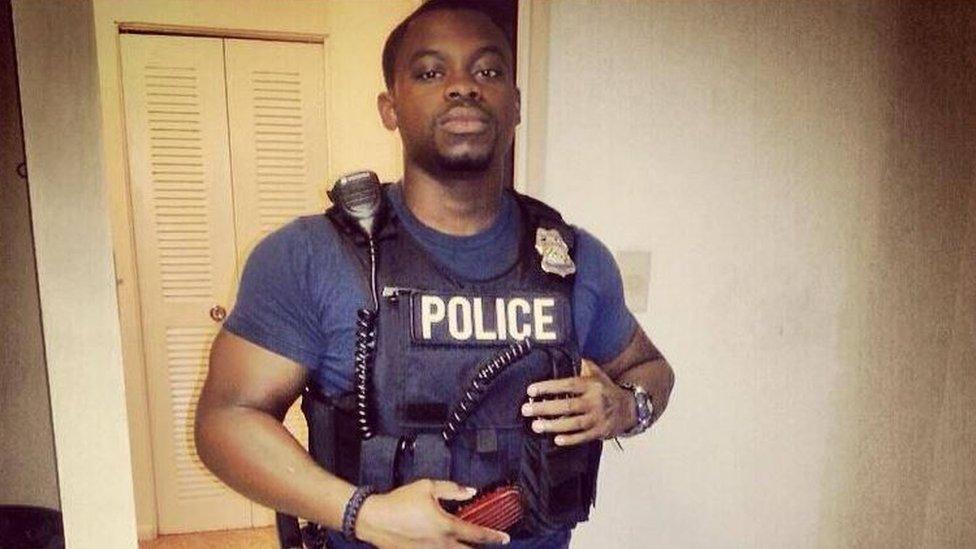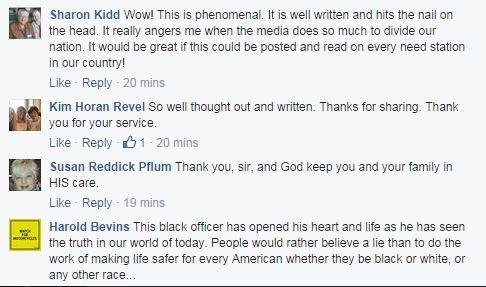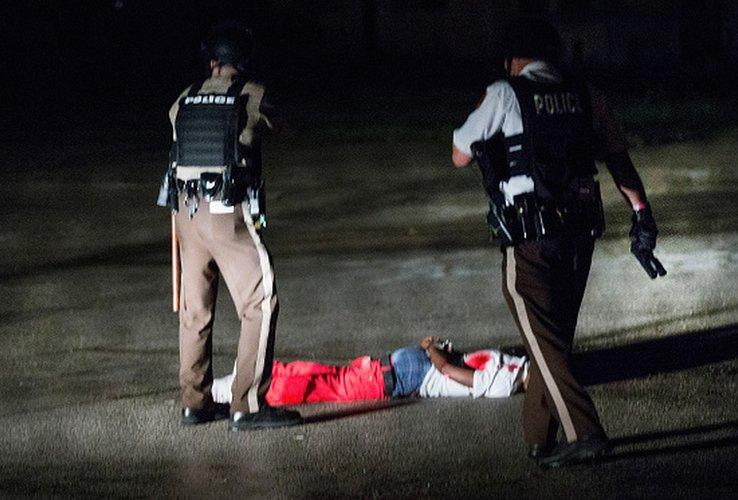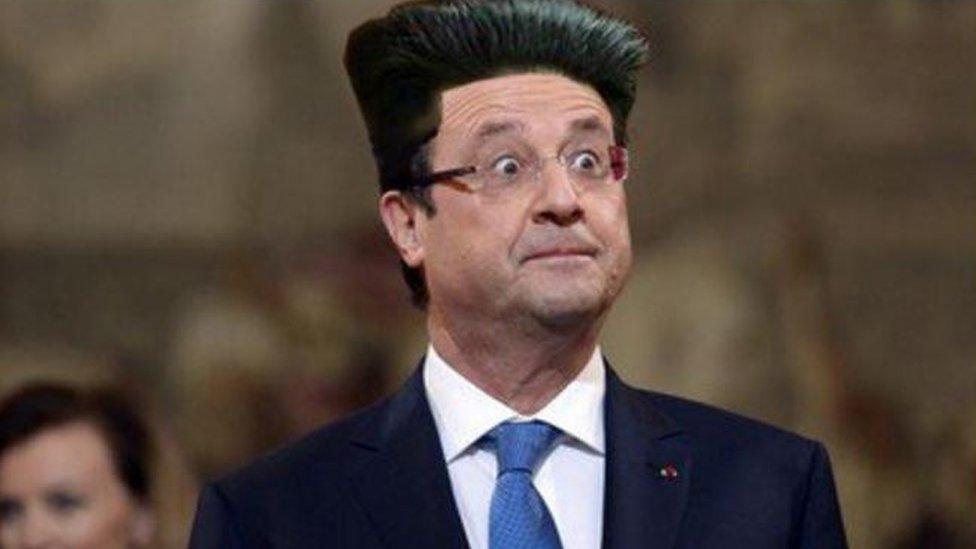The black cop who has a problem with 'Black Lives Matter'
- Published

"Black Lives do not matter to most black people...Only the lives that are taken at the hands of cops or white people, matter."
That is the conclusion of a strongly-worded post, external that has been shared more than 130,000 times on Facebook and has racked up hundreds of thousands of views on other media platforms such as Imgur, external.
While the sentiment is provocative, it is the identity of the author that triggered particular interest. Jay Stalien's profile indicates he is an active police officer in Florida and previously Baltimore. And he is black.
The post was published last weekend, amid mounting racial tensions across America following the murder of five Dallas officers at a protest held over the police killings of two African-American men in Minnesota and Louisiana. Stalien, who says he is a Brooklyn native, was particularly scathing about Black Lives Matter, questioning whether the lives of police officers (including ones who are African-American) were as important to the movement, as black civilians killed by white police officers.
"I couldn't help but wonder if it had been me, a black man, a black cop, on TV, assassinated, laying on the ground dead...would my friends and family still think black lives mattered? Would my life have mattered?" Stalien wrote.
While the official Black Lives Matter Twitter account published a post, external shortly after the Dallas killings, saying that it did not condone violence towards anybody, Stalien's post certainly resonated with a large portion of social media users - many of them supporters of the Blue Lives Matter movement.

In his lengthy digital essay Stalien challenged assertions that black people are unfairly penalised by law enforcement. It was his arguments about black-on-black violence that seemed to get the most attention. Drawing on his own experience, Stalien said he chose a career in law enforcement because:
"I watched and lived through the crime that took place in the hood. My own black people killing others over nothing. Crack heads and heroin addicts lined the lobby of my building as I shuffled around them to make my way to our 1 bedroom apartment with 6 of us living inside. I wanted to help my community and stop watching the blood of African Americans spilled on the street at the hands of a fellow black man."
But Stalien expressed his frustration that his efforts to investigate black-on-black violence and bring the culprits to justice had met with outright hostility from the very community he sought to protect.
"They called me 'Uncle Tom', and 'wanna be white boy', and I couldn't understand why," he wrote.
"My own fellow black men and women attacking me, wishing for my death, wishing for the death of my family. I was so confused, so torn, I couldn't understand why my own black people would turn against me, when every time they called …I was there. Every time someone died….I was there. Every time they were going through one of the worst moments in their lives…I was there. So why was I the enemy?"
Stalien, said that in an attempt to answer that question he looked into some of the most common complaints levelled at police by activists, to see if there was a statistical basis for these grievances. Much of his article is taken up by a point-by point presentation of the results of that research, which Stalien uses to assert that many of the gripes of the Black Lives Matter movement are unfounded.
As this is an area where the use of statistics is particularly contentious, Trending sought a second opinion on some of the Stalien's statistical claims. We spoke with Philip Stinson, external, associate professor of criminal justice at Bowling Green State University in Ohio. So here are a couple of the common complaints which Stalien sets up in his article and then knocks down, followed by Stinson's take on that rebuttal.
Activist complaint 1: "Police always targeting us, they always messing with the black man."
Officer Stalien's view:
"A city where the majority of citizens are black (Baltimore for example) …will ALWAYS have a higher rate of black people getting arrested, it will ALWAYS have a higher rate of blacks getting stopped, and will ALWAYS have a higher rate of blacks getting killed, and the reason why is because a city with those characteristics will ALWAYS have a higher rate of blacks committing crime. The statistics will follow the same trend for Asians if you go to China, for Hispanics if you go to Puerto Rico, for whites if you go to Russia, and the list goes on. It's called Demographics"
Dr Stinson's response:
"I don't agree with his logic. There certainly is implicit bias in many police street encounters with black males. Many police officers in the United States view blacks in these encounters as a threat. Similarly, many of the blacks in these street encounters with police officers are afraid of the police. There are good points to be made on all sides of this issue."

Activist complaint 2: "Blacks are the only ones getting killed by police, or they are killed more."
Officer Stalien's view:
"Fact: As of July 2016, the breakdown of the number of US Citizens killed by Police this year is, 238 White people killed, 123 Black people killed, 79 Hispanics, 69 other/or unknown race."
Dr Stinson's response:
"Blacks are shot and killed by on-duty police officers at a HIGHER RATE than are white persons. In other words, it is misleading to look at the raw numbers without adjusting for population differences."
This view was echoed by analysis published by Quartz, external magazine which concluded that while raw data from 2015 showed that "police have indeed killed nearly twice as many white as black Americans", when you "look at those killings as a share of each ethnic group's population, it's a very different story: black people are at three times as high a risk of dying at the hands of police as white people."
Officer Stalien's view:
"Fact: Black people kill more other blacks than Police do, and there are only protest and outrage when a cop kills a black man. University of Toledo criminologist Dr. Richard R. Johnson examined the latest crime data from the FBI's Supplementary Homicide Reports and Centers for Disease Control and found that an average of 4,472 black men were killed by other black men annually between Jan. 1, 2009, and Dec. 31, 2012. Professor Johnson's research further concluded that 112 black men died from both justified and unjustified police-involved killings annually during this same period.
Dr Stinson's response:
"These numbers are wrong to the extent that the data relied upon are incomplete and inaccurate. Both the Supplemental Homicide Reports and the CDC data sets underreported. We know that, in part, from the Washington Post numbers for 2015 and 2016. But, we do not know if the error and bias in the underreported data in the FBI and/or CDC is systematic or random. As such, I would not use either data set to draw statistically significant conclusions," adds Stinson.
Whatever your take on the data, many found Stalien's post to be a powerful testimony about the complexities of life as a black police officer in the US.
On Tuesday, President Obama addressed both the nation's police and its protestors, external about working together and acknowledging that bridges needed to be built.
At a memorial service for the slain five police officers at Meyerson Symphony Center in Dallas, he said "When anyone paints all police as biased or bigoted, we undermine those officers we depend on for our safety."
Then he added, "America, we know the bias remains. We simply cannot turn away and dismiss those in peaceful protest as troublemakers and paranoid. To have your experience denied like that, dismissed by those in authority, it hurts."
Blog by Megha Mohan, external
Next story: CoiffeurGate: The high cost of French President Francois Hollande's haircut

You can follow BBC Trending on Twitter @BBCtrending, external, and find us on Facebook, external. All our stories are at bbc.com/trending.